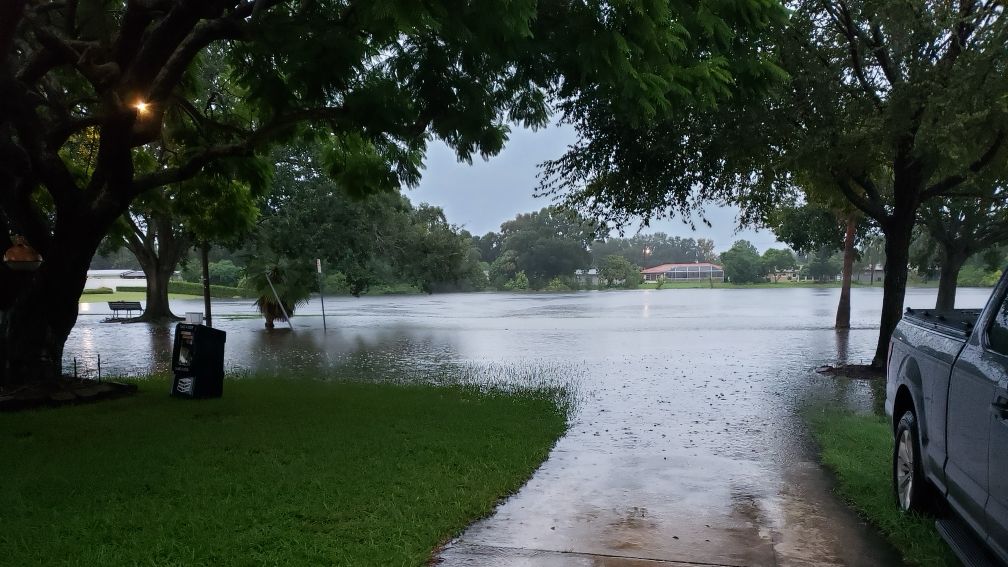ST. PETERSBURG, Fla. — Residents in the Harshaw Lake Park neighborhood in St. Petersburg, which lies in the Disston Heights area with an elevation up to 60 feet, have become increasingly concerned about flooding and stormwater system maintenance.
What You Need To Know
Harshaw Lake Park residents said their streets have been filling with water higher and faster since Hurricane Milton hit last year
Two residents spoke out at a city council meeting in August asking for more storm drain maintenance
Public Works sent a team to scope storm drains and remove debris from drainage ditches
A city spokeperson said drain cleaning does not guarantee the prevention of flooding
“We noticed this summer, we started to have heavy rain events, as we do every year in St. Pete,” said resident Heidi Stiller. “It just seemed that the water was coming up faster than it used to.”
Stiller believes that when Hurricane Milton blew through the area last October, the record rainfall, which sent nearly one inch of floodwater into her home, also clogged the storm drains and ditches. Milton dumped 18.3 inches of rain in St. Petersburg, according to the National Weather Service.
“You have an event like Milton, which really was an exceptional rain event… a thousand-year storm for the City of St. Pete,” she said. “No stormwater system that was built four decades ago is going to be able to handle an event like that. And we certainly understand that.”
Stiller understands hurricanes and the impacts from sea level rise better than most after having worked at NOAA for more than 20 years before leaving the agency.
“Now because of climate change, we’re having heavier precipitation events,” she said. “A warmer atmosphere can just hold more water. So we’re getting these rain bombs.”
Stiller bought her home in 2016, based on her background.
“We picked this neighborhood because it was not at flood risk,” she said. “But in Florida, where it rains, it can flood.”
Stiller said that she and her neighbor, Jen French, have been documenting the high water incidents on the city’s SeeClickFix app. They have also sent messages asking for their storm drains to be inspected but only get the same generic response.
“I think the city gets a lot of reports about stormwater and so they have a stock response,” she said. “The stock response is we’re working on a stormwater plan.”
The residents said that some of the drainage ditches that connect a series of retention lakes have overgrown vegetation. Frustrated with the city’s response, Stiller and French appeared at the Aug. 21 city council meeting and spoke out during public comment.
“Please do the maintenance on the systems we have today,” said French. “Our neighbors have put in multiple complaints, with multiple pictures, and we have not had a response.”
“Please don’t soft pedal the risk,” said Stiller. “Residents need to know to inform our own important economic decisions.”
After that public appearance, Stiller said she got a call from Public Works, and crews have since been out to the neighborhood.
“The city has been in touch with me and my neighbor,” she said. “They have had folks out.”
City spokesperson Samantha Bequer said Public Works conducted a visual inspection and some debris was removed at the southern tip of Harshaw Lake.
“For context, this narrow opening was cleared shortly after Milton, but some growth occurred in the last year,” she stated. “If cattails or other vegetation needs to be clear. The City intends to remove it.”
The crew also scoped the pipes with a camera to determine if any additional work is needed to help the system drain faster, according to Bequer.
“The City regularly maintains drains to prepare them for wet weather events that may cause flooding,” she stated. “However, it should be noted that flooding during wet weather events is not related to drain cleaning.”
Bequer said drain cleaning does not guarantee the prevention of flooding, and often the force from the water will push any remaining debris through the drain. SeeClickFix continues to be the best way for residents to report stormwater issues directly to the City, according to Bequer.

